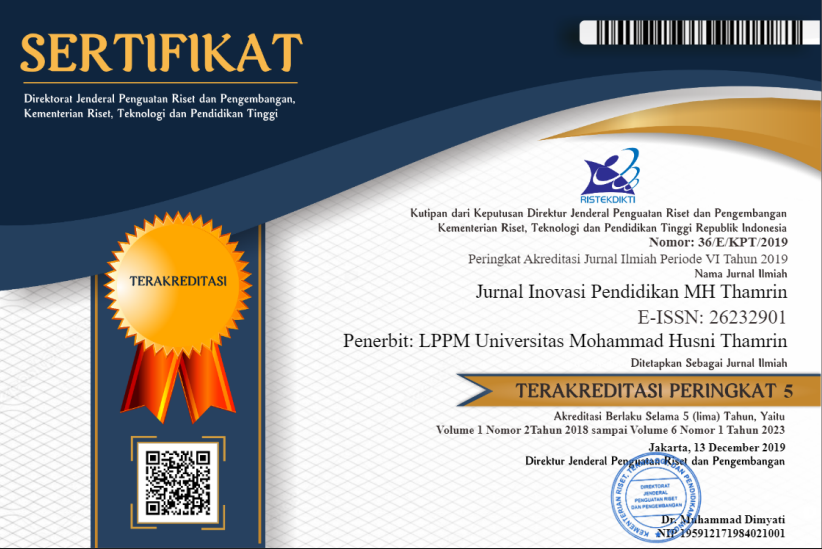The Application of Task-Based Learning to Improve the Quality of The Teaching and Learning Process of Reading in Indonesian Secondary Schools Context
DOI:
https://doi.org/10.37012/jipmht.v2i1.35Keywords:
reading, secondary schools, task-based learning, quality teaching and learning processAbstract
This paper aims to discover the feasibility and the applicability of task-based learning in improving the quality of the teaching and learning process (TLP) of reading in Indonesian secondary schools in relation to the teaching of genre or text types as required by the national curriculum. This is an action research study which is qualitative in nature. The data were obtained through observations and interviews with the students and the collaborators. They were in the forms of field notes, interview transcripts, and photographs. In addition, this research applied the investigator triangulation, the theoretical triangulation and the time triangulation. The actions implemented in this research are discussing new vocabulary items and guessing meaning from context, applying skimming and scanning strategies, discussing grammar related to the text, conducting a question/answer game, providing various materials from different sources, and applying group/pair work. The results of the research show that the students’ motivation increased. They were more enthusiastic in learning reading. Moreover, the students were interested in various materials presented by the teacher. They could get involved actively in the reading learning process. In addition, the classroom interaction also increased. The students could interact very well with other students and the teacher. In conclusion, the use of task-based approach with its accompanying actions is effective to improve the teaching and learning process of reading.
References
Brinkmann, S. 2008. “Interviewingâ€. In Lisa M. Given Ed. The Sage Encyclopedia of Qualitative Research Methods (pp. 470-472). Thousand Oaks, CA: Sage Publications, Inc.
Brown, H.D. 2001. Teaching by Principles: An Interactive Approach to Language Pedagogy. (2nd edition). New York: Addison Weslye Longman, Inc.
Burns, A. 1999. Collaborative Action Research for English Language Teachers. Cambridge. Cambridge: Cambridge University Press.
___________. 2010. Doing Action Research in English Language Teaching: A Guide for Practitioners. New York: Routledge.
Edwards, C. and Willis, J. (Eds). 2005. Teachers Exploring Tasks in English Language Teaching. New York: Palgrave Macmilan.
Feez, S. and Joyce, H. 2002. Text-based Syllabus Design. Sydney: Macquarie University Press.
Gass and Selinker. 2008. Second Language Acquisition: An Introductory Course. New York: Routledge.
Hinkel, E. 2005. Handbook of Research in Second Language Teaching and Learning. New Jersey: Lawrence Erlbaum Associates, Inc.
James, B. and Reign, W. 2001. Reading and Learning Difficulties: Approaches to Teaching and Assessment. Camberwell: The Australian Council for Educational Research Ltd.
Johnson, K. 2008. An Introduction to Foreign Language Learning and Teaching (2nd edition). Edinburgh Gate: Pearson Education Limited.
Kumaravadivelu, B. 2006. TESOL Methods: Changing Tracks, Challenging Trends. TESOL Quarterly 40, 59–81.
Lipka, O. and Siegel, L. S. 2011. The Development of Reading Comprehension Skills in Children Learning English as a Second Language. Retrieved from http://link.springer.com/article/10.1007%2Fs11145-011-9309-8#close
McKechnie, Lynne E.F. 2008. “Observational Researchâ€. In Lisa M.Coiven (Ed). The Sage Encyclopedia of Qualitative Research Methods (pp. 470-472). Thousand Oaks, CA: SAGE Publications, Inc.
Nunan, D. 2004. Task-Based Language Teaching. Cambridge: Cambridge University Press.
Nunan, D. 1985. Language Teaching Course Design: Trends and Issues. Adelaide: National Curriculum Resource Centre.
Prabhu, N.S. 1987a. Second Language Pedagogy. Oxford: Oxford University Press.
Punch, Keith F. 2005. Introduction to Social Research: quantitative and Qualitative Approaches. London: SAGE Publications, Ltd.
Richards, J. C. and Renandya, W. A. 2002. Methodology in Language Teaching: An Anthology of Current Practice. Cambridge: Cambridge University Press.
Richards, J. C. and Rodgers, T. S. 2001. Approaches and Methods in Language Teaching. Cambridge: Cambridge University Press.
Richards, J. C. and Schmidt, R. 2002. Dictionary of Language Teaching and Applied Linguistics. London: Longman.
Skehan, P.1996. A Framework for the Implementation of Task-Based Instruction. Applied Linguistics, 17, 38-62.
Willis, J. 1996. A Framework for Task-Based Learning. Essex: Longman.
Downloads
Published
How to Cite
Issue
Section
Citation Check
License
Jurnal Inovasi Pendidikan MH Thamrin allows readers to read, download, copy, distribute, print, search, or link to the full texts of its articles and allow readers to use them for any other lawful purpose. The journal allows the author(s) to hold the copyright without restrictions. Finally, the journal allows the author(s) to retain publishing rights without restrictions Authors are allowed to archive their submitted article in an open access repository Authors are allowed to archive the final published article in an open access repository with an acknowledgment of its initial publication in this journal.

Jurnal Inovasi Pendidikan MH Thamrin is licensed under a Creative Commons Attribution 4.0 International License.











